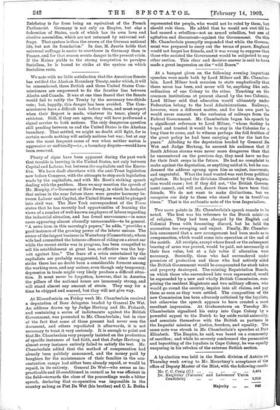Two more points in Mr. Chamberlain's speech remain to le
noted. The first was his reference to the Dutch minisfas of religion. They had been charged by the English and Colonial Press with fomenting discord, but he held the accusation too sweeping and unjust. Finally, Mr. Chamber- lain announced that a new arrangement had been made as to compensation, which would come into operation at the end of the math. All receipts, except where fraud or the subsequent bearing of arms was proved, would be paid, not necessarily at their face value, but at a fair value if alteration were necessary. Secondly, those who had surrendered under promises of protection and those who had actively aided the British Government would be compensated for stock taken and property destroyed. The existing Repatriation Boards, on which those who surrendered late were represented, would be superseded by a new and wholly British Commission, coin- prising the resident Magistrate and two military officers, who would go round the country, inquire into all claims, and pay them as soon as they were settled. The composition of the new Commission has been adversely criticised by the loyalists, but otherwise the speech appears to have created a most excellent impression. At Grahamstown on Tuesday Mn Chamberlain signalised his entry into Cape Colony by a powerful appeal to the Dutch to lay aside racial animosity, and associate themselves with the British as partners in the Imperial mission of justice, freedom, and equality. The same note was struck in Mr. Chamberlain's speeches at Port Elizabeth. The Empire, he said, was based on a community of sacrifice; and while he severely condemned the persecution and boycotting of the loyalists in Cape Colony, he was equally unsparing in his rebukes of the extreme British section.






































 Previous page
Previous page